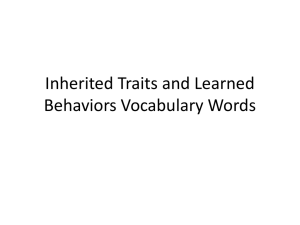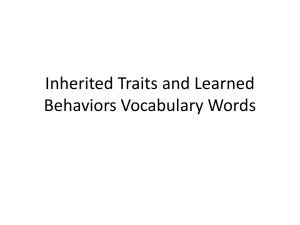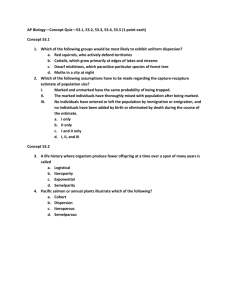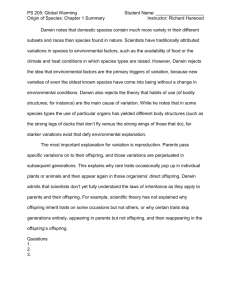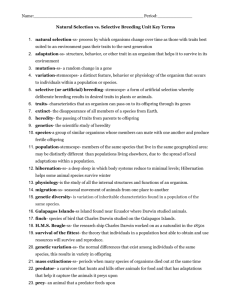From Ordinatio IV, d. 26, the single question: “Was marriage
advertisement
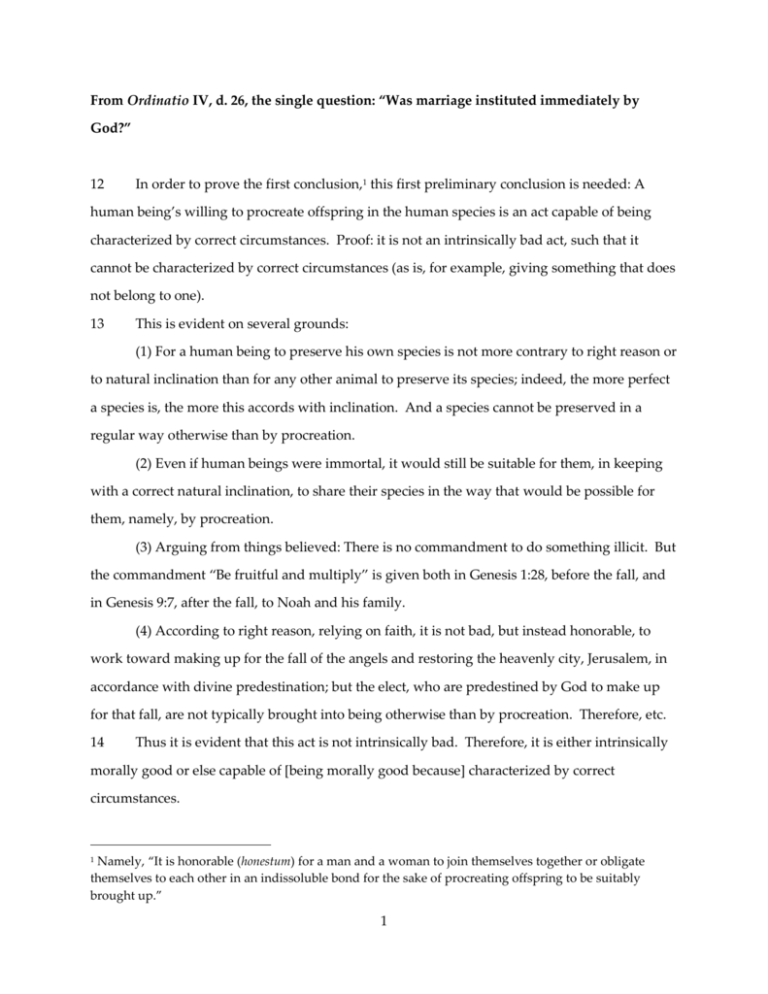
From Ordinatio IV, d. 26, the single question: “Was marriage instituted immediately by God?” 12 In order to prove the first conclusion,1 this first preliminary conclusion is needed: A human being’s willing to procreate offspring in the human species is an act capable of being characterized by correct circumstances. Proof: it is not an intrinsically bad act, such that it cannot be characterized by correct circumstances (as is, for example, giving something that does not belong to one). 13 This is evident on several grounds: (1) For a human being to preserve his own species is not more contrary to right reason or to natural inclination than for any other animal to preserve its species; indeed, the more perfect a species is, the more this accords with inclination. And a species cannot be preserved in a regular way otherwise than by procreation. (2) Even if human beings were immortal, it would still be suitable for them, in keeping with a correct natural inclination, to share their species in the way that would be possible for them, namely, by procreation. (3) Arguing from things believed: There is no commandment to do something illicit. But the commandment “Be fruitful and multiply” is given both in Genesis 1:28, before the fall, and in Genesis 9:7, after the fall, to Noah and his family. (4) According to right reason, relying on faith, it is not bad, but instead honorable, to work toward making up for the fall of the angels and restoring the heavenly city, Jerusalem, in accordance with divine predestination; but the elect, who are predestined by God to make up for that fall, are not typically brought into being otherwise than by procreation. Therefore, etc. 14 Thus it is evident that this act is not intrinsically bad. Therefore, it is either intrinsically morally good or else capable of [being morally good because] characterized by correct circumstances. Namely, “It is honorable (honestum) for a man and a woman to join themselves together or obligate themselves to each other in an indissoluble bond for the sake of procreating offspring to be suitably brought up.” 1 1 15 Proof that it is not intrinsically sufficiently good in terms of moral goodness: no willing is intrinsically good in virtue of having a morally good object unless its object is intrinsically worthy of being willed, in other words, unless its object is the unqualifiedly ultimate good. Such willing is loving God, which can never be contrary to right reason; indeed, it is necessarily in accord with right reason that such an act tend toward such an object. But that is because this object is the ultimate end, which is to be willed in its own right by everything ordered to the end, in whatever way it can love that end. For a human being can distinguish everything that is for the end either rightly or wrongly, because it can order it to God and thus use it, or not order it to God and thus enjoy it, which is a great sin.2 16 But it is evident that the object of the act of procreating or of willing to procreate offspring is not the ultimate end, but merely something ordered, or capable of being ordered, to the ultimate end. Therefore, such an act is not intrinsically sufficiently morally good. Therefore, it is capable of [being morally good in virtue of] being characterized by the right circumstances.3 17 Moreover, one can offer a single argument to prove both points, i.e., that this act is morally neither intrinsically good nor intrinsically bad: The only act that is intrinsically bad is one whose object is incompatible with that act’s being good or whose object is incompatible with the goodness of the act, or else one that is incompatible with someone who acts according to right natural reason. And, conversely, the only act that is intrinsically good is one whose object is necessarily fitting for the act of someone who acts according to right reason. Now the procreation of children is neither incompatible with a human being nor necessarily fitting according to right reason. Therefore, this act is neither intrinsically good nor intrinsically bad. For no act is perfectly good simply in virtue of its genus4—in other words, solely in virtue of its object—except for the act of loving God, which has goodness solely in virtue of its object; and no act is bad [simply] in virtue of its genus—in other words, solely in virtue of its object— PZN omit the preceding sentence and part of the next, continuing, “But this [act] is not the ultimate end,” etc. 3 PZN omit the preceding sentence as well as all of nn. 17–18, though Q (not collated by the editors) includes them, with some minor textual variants. 4 Reading perfecte bonus ex genere tantum (Q) for the edition’s bonus ex genere (A). 2 2 except for the act of hating God. Hence, neither of these acts needs to be specified or can be characterized by circumstances5 [that change its goodness or badness]: for God cannot be loved too much (I am speaking here of friendship-love), and there is no good way for anyone to hate God. 18 This, then, is the first [preliminary] conclusion: willing to procreate offspring is an act that can be characterized by correct circumstances. 19 The second conclusion is that the first circumstance required for the moral goodness of this act is the circumstance of the end, as is universally true in moral matters. In the present case, that circumstance is this: willing to procreate offspring to be brought up religiously in order to expand the worship of God. 20 This is proved by reason: the end of human beings is perfect human activity, as we read in Ethics I (1099a7–1099b28) and X (1174b18–1175a1)6; therefore, it is for the sake of this end that a given person ought to will to have offspring. 21 It is also proved from things believed: everyone ought to love his neighbor from charity as he loves himself, that is, with a view to the same end. And everyone ought to love himself with a view to an honorable way of life and to the worship of God. Therefore, everyone ought to love his neighbor—and above all his offspring, to whom he is specially bound—in that same way. 22 This is confirmed through Augustine, Super Genesim IX: “Not all who have offspring have the good of offspring, since it is not the offspring themselves who are said to be the good of offspring, but rather the hope or desire by which one seeks offspring so that they might be instructed in religion.”7 23 There follows a second circumstance, namely, that this act ought to be of determinate Reading oportet specificare nec est circumstantionabilis (Q) for the edition’s oportet specificare vel circumstantionare; nec est circumstantionabilis (A). 6 Cf. Scotus, Ordinatio IV d. 10 n. 274. 7 Or “molded religiously,” or something like that. The quotation actually derives from Lombard, Sent. IV d. 31 c. 2 n. 4, but Richard Middleton attributes it to Augustine in his commentary on the Sentences (IV d. 31 princ. 1 q. 3 in corp.); there is something vaguely (but not very) like it in De Genesi ad litteram IX.7. 5 3 persons, male and female.8 That it ought to be of male and female is not a circumstance; that’s included necessarily in the act of procreating offspring. But that it be of determinate persons is a circumstance on the part of the agent causes.9 For indiscriminate copulation is contrary to (a) the good of the offspring (which is the intended end), (b) the good of the family, and (c) the good of the city. 24 Proof of the first (a): offspring would not be religiously educated on the part of the parents, since they would not have determinate knowledge of their offspring—at any rate, the father wouldn’t, and so he would not be so careful about imposing the appropriate discipline on his offspring.10 And conversely the offspring would not be as apt to offer the father obedience or the appropriate respect and filial fear, and it is on account of such fear that a son is more obedient to his father and can be disciplined by his father more easily than by anyone else. 25 Proof of the second (b): the good of the family consists in the principal persons of the family cleaving firmly to each other; otherwise, the whole thing would be indiscriminate. And for this reason the Philosopher says in Ethics VIII (1162a17–19) that human beings are naturally “conjugal” animals in that they are suited for life in a household. And no other persons would give adequate attention to each other’s needs or to the needs of their offspring. 26 The third point (c), that it is contrary to the good of the city, is evident from the fact that friendship among the citizens is sustained by matrimonial contracts of this sort; therefore, such contracts ought to be between definite persons, since the friendship of citizens is, for the most part, derived from determinate intimacy at a specified level—whereas if there were indiscriminate copulation, there would be no known and specified intimacy to serve as the The edition precedes this sentence with Sed haec circumstantia non sufficit, licet sit prima et concludens omnes alias; et ideo, “But this circumstance is not sufficient, even though it is the first and encompasses all the others. And therefore” (A). If the first circumstance really did encompass or include (concludens) all the others, it would be sufficient. As usual, the editors would rather print gibberish from A than good sense from all the other MSS. 9 The edition, following A alone, adds “that are due and appropriate for this end—not only for the procreation of offspring but also for repeated procreation of offspring. Now I say ‘repeated’ because it is fitting that one man have determinately one woman not only for procreation but also for repeated procreation, for nature does not allow just anyone to copulate with just anyone, and that is not found even in beasts. But it is evident that this act ought to be determinately of one man with one woman.” 10 Or perhaps “providing the appropriate teaching for his offspring”—but disciplina seems clearly to be ‘discipline’ in the next sentence, and so I have translated accordingly here as well. 8 4 cause of friendship; indeed, all intimacies would be confused. 27 And that is why Aristotle in Politics II (1261a4–12) is right to criticize the polity of Socrates, who wanted all wives to be in common. For in the state of fallen nature what Aristotle himself proposes is much better, namely, that a determinate person shall have a determinate spouse. And indiscriminate copulation of male and female would be contrary to reason in every state. 28 This circumstance is also evident from things believed, through Holy Scripture, since Genesis 2:24 says, “The two will be one flesh,” and Christ says the same thing in Matthew 19:5; and the Apostle says in 1 Corinthians 7:2, “Let each man have his own wife” (read: on account of fornication). And even granting that this determination would not be proved by natural reason to be unqualifiedly necessary, in such a way that its opposite would be repugnant to natural and manifest reason, at any rate this affirmative statement is sufficiently evident: it is honorable for persons belonging to the Church to be determinately conjoined one with another for this act. 29 Now the other circumstance—that it is honorable for these persons to be obligated to one another in an indissoluble bond for this end—is proved from the preceding. For just as determinacy of the persons contributes to the due education of the offspring and to the good of the family and of the city, the permanent cleaving of these determinate persons one to another also contributes to this same end; but because so many things can happen and so many difficulties can arise, they would not cleave to each other permanently unless they were obligated to do so by this sort of indissoluble bond. 30 And even granting that it could not be proved evidently by natural reason that this conclusion (which is the foremost conclusion in this section) is unqualifiedly necessary, what we set out to prove has been proved, namely, that it is honorable and consonant with natural reason that a man and woman should be under such an obligation for the sake of such an end. 31 And from this the solution to one question is evident: namely, whether such an obligation belongs to the law of nature. For I explained earlier, in distinction 17 [n. 19], that what belongs to the law of nature in the most proper sense is a practical principle known per se and a conclusion deriving demonstratively from such a principle. In a second sense, however, a 5 [practical] truth that is evidently consonant with such principles and conclusions, though it does not follow from them necessarily, also belongs to the law of nature. And in this latter way “It is honorable for a man and a woman to be obligated to the aforesaid end” belongs to the law of nature. 6

